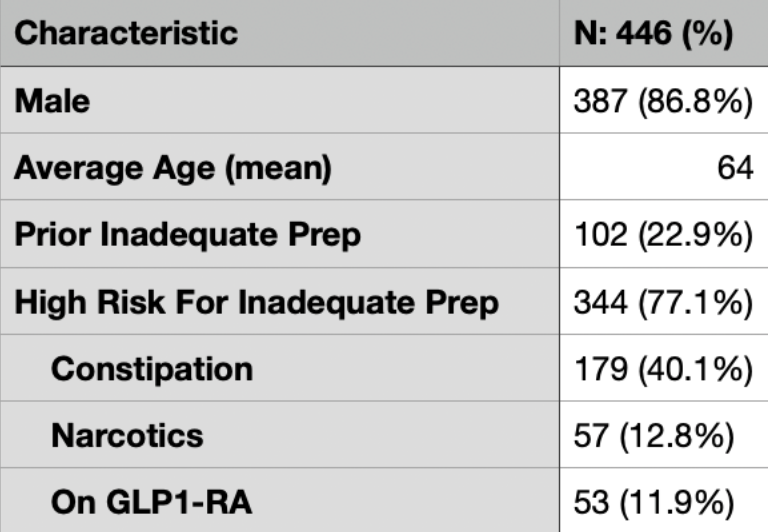Monday Poster Session
Category: General Endoscopy
P2983 - Preventing Inadequate Colonoscopy Bowel Preparation With the Targeted Addition of Adjuncts: A Quality Improvement Study
Monday, October 27, 2025
10:30 AM - 4:00 PM PDT
Location: Exhibit Hall

Raya Abu Tawileh, MD
Detroit Medical Center/Wayne State University
Detroit, MI
Presenting Author(s)
Hussam Sabbagh, MD1, Anshu Wadehra, MD1, Fadi Antaki, MD2, Raya Abu Tawileh, MD3, Peter Morkos, MD3, Abigail Limary, BS4, Samara Rifkin, MD5, Angy Hanna, MD5, Ziad Kanaan, MD5, Kirthi Lilley, MD5
1Wayne State University School of Medicine / Detroit Medical Center, Detroit, MI; 2John D. Dingell VA Medical Center & Wayne State University School of Medicine, Detroit, MI; 3Detroit Medical Center/Wayne State University, Detroit, MI; 4Wayne State School of Medicine, Detroit, MI; 5Wayne State University School of Medicine /John D. Dingell VA Medical Center, Detroit, MI
Introduction: The success of colonoscopy is dependent on adequate bowel preparation (prep). Multiple strategies have been proposed to improve prep quality. We have previously reported success of using a large volume bowel prep regimen (6L of PEG-3350) for those with risk factors (92.5%) or prior inadequate prep (87.7%). However, the 6L prep is not patient friendly. This study evaluates the impact of using an alternative enhanced prep regimen consisting of combining 15 mg bisacodyl to 4L PEG-3350 on a split schedule for patients at risk for inadequate prep.
Methods: This was a quality improvement project. Patients scheduled for outpatient colonoscopy for all indications, who were considered at high risk for inadequate bowel prep, were prescribed an enhanced regimen. High risk was defined as a history of inadequate or fair bowel prep on prior colonoscopy, or one or more risk factors, such as constipation, obesity, diabetes mellitus with complications, and use of laxatives, tricyclics, opiates, or GLP-1 agonists. Data was collected over 12 months after implementation of this policy. Enhanced prep regimen consisted of 15 mg bisacodyl, followed by 4L PEG-3350 on a split dose schedule (6pm the day prior and then 5 hours prior to appointment time). For all other patients, standard prep was 4L PEG prep on a split-dose schedule was given. Primary outcome was adequate cleansing defined as Boston Bowel Preparation Scale (BBPS) of 6 or higher, with a score of 2 or higher in each segment.
Results: Of 2027 outpatient colonoscopies performed during the study period, 446 high risk patients were identified (102 patients with prior inadequate prep and 344 with risk factors) and prescribed the enhanced regimen. 86.8% were males. Average age was 64. 397 (89%) of the high-risk patients had adequate bowel prep. Among the other patients, bowel prep was adequate 93% of the time (p=0.0062) for a combined adequacy rate of 91% for all outpatient colonoscopies during that timeframe.
Discussion: This enhanced bowel prep regimen is an effective option for those identified as high-risk for inadequate prep, to help maintain overall adequate prep quality at >90% as recommended by recent guidelines. The success of the enhanced bowel regimen is still somewhat lower as compared to those without risk factors; however, this study confirms that this is a good alternative to the previously used large volume (6L) PEG-3350 regimen for those at increased risk for inadequate cleansing.

Figure: Table 1. Demographics

Figure: Table 2. Results
Disclosures:
Hussam Sabbagh indicated no relevant financial relationships.
Anshu Wadehra indicated no relevant financial relationships.
Fadi Antaki indicated no relevant financial relationships.
Raya Abu Tawileh indicated no relevant financial relationships.
Peter Morkos indicated no relevant financial relationships.
Abigail Limary indicated no relevant financial relationships.
Samara Rifkin indicated no relevant financial relationships.
Angy Hanna indicated no relevant financial relationships.
Ziad Kanaan indicated no relevant financial relationships.
Kirthi Lilley indicated no relevant financial relationships.
Hussam Sabbagh, MD1, Anshu Wadehra, MD1, Fadi Antaki, MD2, Raya Abu Tawileh, MD3, Peter Morkos, MD3, Abigail Limary, BS4, Samara Rifkin, MD5, Angy Hanna, MD5, Ziad Kanaan, MD5, Kirthi Lilley, MD5. P2983 - Preventing Inadequate Colonoscopy Bowel Preparation With the Targeted Addition of Adjuncts: A Quality Improvement Study, ACG 2025 Annual Scientific Meeting Abstracts. Phoenix, AZ: American College of Gastroenterology.
1Wayne State University School of Medicine / Detroit Medical Center, Detroit, MI; 2John D. Dingell VA Medical Center & Wayne State University School of Medicine, Detroit, MI; 3Detroit Medical Center/Wayne State University, Detroit, MI; 4Wayne State School of Medicine, Detroit, MI; 5Wayne State University School of Medicine /John D. Dingell VA Medical Center, Detroit, MI
Introduction: The success of colonoscopy is dependent on adequate bowel preparation (prep). Multiple strategies have been proposed to improve prep quality. We have previously reported success of using a large volume bowel prep regimen (6L of PEG-3350) for those with risk factors (92.5%) or prior inadequate prep (87.7%). However, the 6L prep is not patient friendly. This study evaluates the impact of using an alternative enhanced prep regimen consisting of combining 15 mg bisacodyl to 4L PEG-3350 on a split schedule for patients at risk for inadequate prep.
Methods: This was a quality improvement project. Patients scheduled for outpatient colonoscopy for all indications, who were considered at high risk for inadequate bowel prep, were prescribed an enhanced regimen. High risk was defined as a history of inadequate or fair bowel prep on prior colonoscopy, or one or more risk factors, such as constipation, obesity, diabetes mellitus with complications, and use of laxatives, tricyclics, opiates, or GLP-1 agonists. Data was collected over 12 months after implementation of this policy. Enhanced prep regimen consisted of 15 mg bisacodyl, followed by 4L PEG-3350 on a split dose schedule (6pm the day prior and then 5 hours prior to appointment time). For all other patients, standard prep was 4L PEG prep on a split-dose schedule was given. Primary outcome was adequate cleansing defined as Boston Bowel Preparation Scale (BBPS) of 6 or higher, with a score of 2 or higher in each segment.
Results: Of 2027 outpatient colonoscopies performed during the study period, 446 high risk patients were identified (102 patients with prior inadequate prep and 344 with risk factors) and prescribed the enhanced regimen. 86.8% were males. Average age was 64. 397 (89%) of the high-risk patients had adequate bowel prep. Among the other patients, bowel prep was adequate 93% of the time (p=0.0062) for a combined adequacy rate of 91% for all outpatient colonoscopies during that timeframe.
Discussion: This enhanced bowel prep regimen is an effective option for those identified as high-risk for inadequate prep, to help maintain overall adequate prep quality at >90% as recommended by recent guidelines. The success of the enhanced bowel regimen is still somewhat lower as compared to those without risk factors; however, this study confirms that this is a good alternative to the previously used large volume (6L) PEG-3350 regimen for those at increased risk for inadequate cleansing.

Figure: Table 1. Demographics

Figure: Table 2. Results
Disclosures:
Hussam Sabbagh indicated no relevant financial relationships.
Anshu Wadehra indicated no relevant financial relationships.
Fadi Antaki indicated no relevant financial relationships.
Raya Abu Tawileh indicated no relevant financial relationships.
Peter Morkos indicated no relevant financial relationships.
Abigail Limary indicated no relevant financial relationships.
Samara Rifkin indicated no relevant financial relationships.
Angy Hanna indicated no relevant financial relationships.
Ziad Kanaan indicated no relevant financial relationships.
Kirthi Lilley indicated no relevant financial relationships.
Hussam Sabbagh, MD1, Anshu Wadehra, MD1, Fadi Antaki, MD2, Raya Abu Tawileh, MD3, Peter Morkos, MD3, Abigail Limary, BS4, Samara Rifkin, MD5, Angy Hanna, MD5, Ziad Kanaan, MD5, Kirthi Lilley, MD5. P2983 - Preventing Inadequate Colonoscopy Bowel Preparation With the Targeted Addition of Adjuncts: A Quality Improvement Study, ACG 2025 Annual Scientific Meeting Abstracts. Phoenix, AZ: American College of Gastroenterology.
